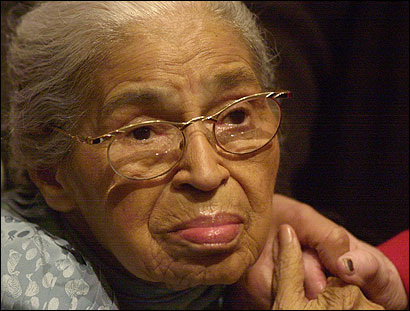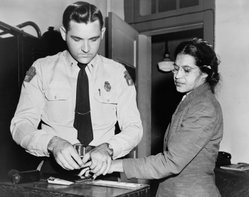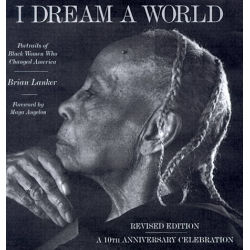
Congressmember Barbara Lee
THE PASSING OF ROSA PARKS
If things continue upon their present course–which "things" have that interesting habit of not always doing–somewhere in a school in North Oakland 50 years from now, a teacher will stand before a class and tell her (his) students the story of the day in 2003 when a courageous black woman, grown weary of the lies of the Bush Administration, stood up by herself in the United States Congress following the 9/11 attacks and cast the single vote against the President's request for blanket war authorization, thus sparking a national movement that eventually led to both the collapse of neoconism as well as the end of the stranglehold of the radical religious right on the government of the country.

Congressmember Barbara Lee
50 years from now I don't plan on being anywhere near North Oakland–not
that I don't like North Oakland, I just have other plans for that time period–but
some of you will almost certainly be around, and you will remember these days, and
you will say patiently (but a little wearily, because you've grown tired of correcting
this particular mistake) that yes, what Barbara Lee did was absolutely courageous
and no, you don't want to minimize it's historical importance or how much it inspired
people at the time, but she was, after all, only part of a greater thing going on
in the Bay Area in opposition to Bush and the neocons and the war, and it is that
thing going on of people and opinions and actions and accomplishments which must
be studied and talked about if one is to understand the history of those (these)
times.
But history loves the simple tale, if for nothing else in that it is so simple to
tell.
 And so, this week, upon the death of the dear Ms. Rosa Parks, we must
suffer through the recitation of the story–once more–about the courageous little
Alabama black woman who got tired one day coming from work and refused to give up
her seat on the bus to a white man, thus on-and-on, you know the rest of the tale.
And so, this week, upon the death of the dear Ms. Rosa Parks, we must
suffer through the recitation of the story–once more–about the courageous little
Alabama black woman who got tired one day coming from work and refused to give up
her seat on the bus to a white man, thus on-and-on, you know the rest of the tale.
And at the risk of being accused of kicking dirt on the freshly dug grave of a beloved
national and civil rights movement icon, we are forced to say, once again, that no,
that's not exactly how it happened, and that it doesn't take away anything from Rosa
Parks to tell it right.
At the time of Ms. Parks' historic act in the mid-1950's, there were a number of
African-American organizations in Montgomery–some of them based in the black church,
some of them with ties to the union movement, some of them based in the black business
or educational establishments–that had long been working to end racial segregation
in public accomodations in that city. Rosa Parks herself was secretary of the local
branch of the National Association for the Advancement of Colored People, which had
membership from all of those factions.
 As the story is told by those who were there at the time, in
refusing to give up her seat, Ms. Parks actually repeated an action that had been
taken several weeks before by another young black woman. Black Montgomery leaders
briefly considered making that earlier action a test case, but decided against it
when they learned that the young woman had a child out of wedlock. Afraid that Montgomery's
white segregationist establishment would pound on that single fact–"niggers
dropping babies without fathers"–to turn local and national attention away from
the issue of segregation, the black leaders searched around for someone who could
not be attacked on such "moral" grounds. Rosa Parks was chosen, and the
refuse-to-give-up-her-seat-on-the-bus incident was restaged so that she could be
arrested, and the black bus boycott instituted as a "spontaneous" response
of outrage.
As the story is told by those who were there at the time, in
refusing to give up her seat, Ms. Parks actually repeated an action that had been
taken several weeks before by another young black woman. Black Montgomery leaders
briefly considered making that earlier action a test case, but decided against it
when they learned that the young woman had a child out of wedlock. Afraid that Montgomery's
white segregationist establishment would pound on that single fact–"niggers
dropping babies without fathers"–to turn local and national attention away from
the issue of segregation, the black leaders searched around for someone who could
not be attacked on such "moral" grounds. Rosa Parks was chosen, and the
refuse-to-give-up-her-seat-on-the-bus incident was restaged so that she could be
arrested, and the black bus boycott instituted as a "spontaneous" response
of outrage.
Personally, I think that either action-the spontaneous one of the earlier black woman
as well as Ms. Parks' planned demonstration-took equal courage in Montgomery in the
mid-1950's, but that's just me.
And it is also interesting to see how little things have changed in human nature
in the past 50 years. In the mid 1950's, just as it is today in 2005, it was easy
to get people distracted from issues, muddying the waters with one moral issue-having
a child out of wedlock-in order to cover up another one-oppressing a group of people
because of their race.
In any event, Rosa Parks herself tended to both resist her own deification and to
try to tell the truth about what really happened in the months leading up to the
Montgomery bus boycott. I got the chance to interview her by telephone some years
ago, and she confessed that months before she refused to give up her seat, she was
"very nervous, very troubled in my mind about the events that were occurring
in Montgomery."
At that time, the summer of 1955, she was attending civil rights training workshops
at a longtime labor and radical movement center called Highlander in Tennessee. One
of her trainers was a woman named Septima Clark of Charleston, a giant in the civil
rights movement, but someone you've probably heard little or nothing about. "I
had the chance to work with Septima" at Highlander, Ms. Parks told me. "She
was such a calm and dedicated person in the midst of all that danger. I thought,
'If I could only catch some of her spirit.' I wanted to have the courage to accomplish
the kinds of things that she had been doing for years."

Septima Clark
Septima Clark was certainly someone to look up to. She had joined
the NAACP in 1919–only a few months after it was formed–and worked in its initial
campaign to end lynchings in the Deep South. As frightening as Montgomery in 1955
seems to us now-with its white terrorist bombings and racial murders and police attack
dogs-South Carolina in the 1920's was a hundred times more dangerous for civil rights
and Black Freedom advocates.
But just like Ms. Parks, Septima Clark always minimized her own accomplishments,
giving credit to the people who had come before her in even more dangerous times.
The black Reconstruction-era officeholders, for example, who faced assassination
in the reign of terror that came after union troops were pulled out of the South
in the 1870's, the time of the original formation of the Ku Klux Klan by former Confederate
officers and soldiers. Or, earlier than that, the Charleston Sea Island black folk–the
people known as the Gullah–who had seized plantation lands from slavemasters in the
midst of the Civil War, received General William Sherman's promise that they could
keep it (the famous "40 acres and two mules Special Field Order"), and
later refused to give it up even after the United States Congress said that the former
Confederates should have their land back. These were the people Septima Clark looked
to for stories of courage and inspiration.
Looking at Rosa Parks, therefore, we don't see as much a "beginning"–a
single spark lighting a prairie fire, to use Mao tse Tung's famous phrase often-quoted
by 60's-era radicals–as we do a "continuation," a string of history running
backwards and forwards through the momentous events of Montgomery, 1955, with courageous
people rising to meet the challenges at different points, some of them well-known,
some of them anonymous and lost to the history books.
With Rosa Parks' passing this week, therefore, we don't see the end of the story.
It's only the turning of a page, and the moving on to another chapter. 50 years from
now, I hope that's the story that gets told.
[Note:When this column was originally written, it contained the erroneous statement that Barbara Lee's lone vote was against President George Bush's Iraq War Authorization.]